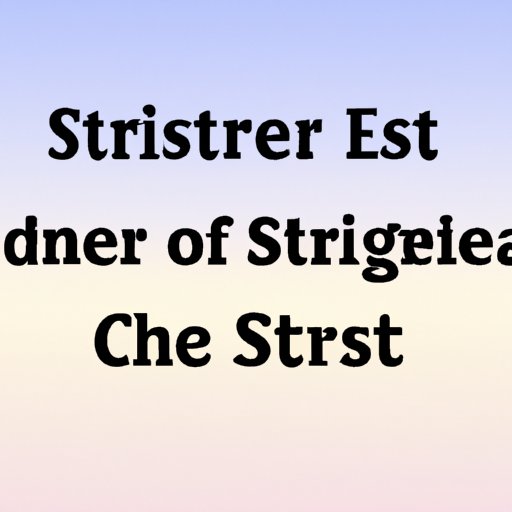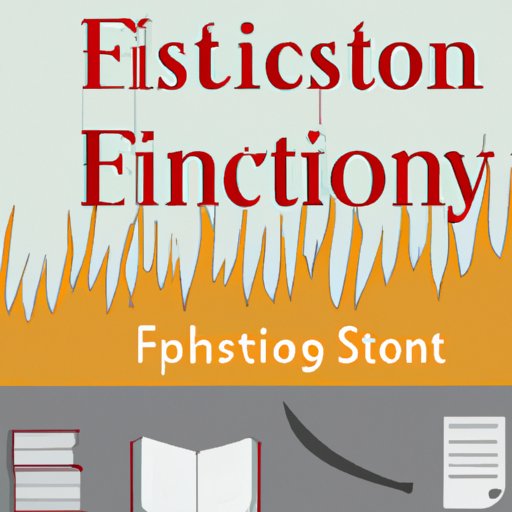Introduction
Fiction literature is a type of literature that tells stories about characters and events that are created by the author, rather than being based on real people and actual events. This type of literature is often referred to as “fiction” or “imaginative literature” and includes genres like novels, novellas, short stories, and plays. Fiction literature can be used to explore themes and issues, as well as to entertain readers with exciting tales of adventure, romance, and mystery.
Exploring Different Types of Fiction Genres
Fiction literature comes in many different genres, each of which has its own unique characteristics and conventions. Some of the most popular genres of fiction include fantasy, science fiction, horror, romance, historical fiction, and crime/mystery. Each genre features its own distinct style of writing and story structure, as well as certain tropes and conventions that readers have come to expect from these types of stories.
For example, fantasy stories typically feature magical elements and mythical creatures, while science fiction stories involve advanced technology and space exploration. Horror stories use suspense and fear to create an atmosphere of dread, while romance stories focus on relationships between characters. Historical fiction takes place in a specific time period and often includes references to real-world events, while crime/mystery stories usually involve a detective solving a case.
Some examples of classic fiction books within each genre include J.R.R. Tolkien’s The Lord of the Rings (fantasy), H.G. Wells’ The War of the Worlds (science fiction), Mary Shelley’s Frankenstein (horror), Jane Austen’s Pride and Prejudice (romance), Margaret Mitchell’s Gone with the Wind (historical fiction), and Arthur Conan Doyle’s The Adventures of Sherlock Holmes (crime/mystery).
Examining Popular Fiction Books
Many of the most popular fiction books have been written by renowned authors such as J.K. Rowling, Stephen King, and Harper Lee. These authors have crafted stories that have captivated readers around the world and have become some of the most beloved books of all time. Common themes found in these books include love, loss, identity, justice, power, and morality.
Settings are also important in fiction books, as they provide a backdrop for the story and help to bring the characters and their struggles to life. Popular settings for fiction books include small towns, cities, fantasy worlds, outer space, and alternate universes. No matter the setting, these books allow readers to escape into a different world and experience something new and exciting.

Analyzing the Benefits of Reading Fiction
Reading fiction can provide a number of benefits for both children and adults. According to a study conducted by the National Endowment for the Arts, readers of fiction showed higher levels of empathy than non-readers, suggesting that reading fiction can enhance one’s ability to understand and relate to others. Additionally, reading fiction can help to develop critical thinking skills, as readers must analyze and interpret the text in order to fully understand the story.
Fiction can also help to enhance one’s imagination, as readers are encouraged to visualize the story and its characters. This can be especially beneficial for students, as it can help to foster creativity and improve problem-solving abilities. As University of Toronto professor Keith Oatley explains, “The skills you develop by reading fiction are the same ones you use when you are writing fiction.”

Investigating the History of Fiction Literature
The origin of fiction literature can be traced back to ancient Greece, where Homer wrote the epic poems The Iliad and The Odyssey. These works featured heroic characters and fantastical adventures, setting the stage for the development of other fictional works throughout history. Over time, fiction evolved to encompass many different genres and styles, from the classic novels of Charles Dickens to the modern short stories of Jhumpa Lahiri.
Fiction literature has also changed in terms of content and themes. In the 18th century, novels were largely focused on morality and virtue, while today’s fiction often explores social issues such as racism, sexism, and poverty. This shift reflects the changing nature of society and how fiction can be used to explore and discuss difficult topics in a safe and meaningful way.
Exploring the Role of Fiction in Society
Fiction literature can be used to represent and discuss social issues in a way that allows readers to gain insight and understanding. For example, Harper Lee’s To Kill a Mockingbird is a powerful exploration of racism in the American South during the 1930s, while Toni Morrison’s Beloved is a haunting look at the legacy of slavery in the United States. By telling stories about characters and their struggles, these books can help to open up conversations about important topics.
Fiction also has the power to shape public opinion and influence behavior. Studies have shown that reading fiction can increase empathy and open-mindedness, as readers are exposed to different perspectives and viewpoints. This can lead to greater understanding and tolerance of different cultures and beliefs, as well as increased acceptance of social change.

Crafting a Short Story: A Guide for Beginners
Writing a short story can be a challenging but rewarding experience. It requires careful planning and attention to detail, as well as a strong grasp of narrative structure and character development. Here is a brief guide to help beginners get started on crafting their own short story.
First, choose a topic or theme to explore. This could be anything from a personal experience to a historical event or current issue. Once you have a topic in mind, it’s time to start developing your characters. Think about who will be involved in the story and how they will interact with each other. You can also consider creating a setting for your story, as this can help to add depth and context to the narrative.
Next, begin writing the story. Start with a clear introduction and then introduce the characters and the setting. As you write, make sure to keep the plot moving forward and build tension throughout the story. Finally, once the story is finished, take some time to edit and revise it. Make sure to check for any errors or inconsistencies, as well as any areas that need more clarification or development.
Conclusion
Fiction literature is a type of literature that tells stories about characters and events that are created by the author. It comes in many different genres, including fantasy, science fiction, horror, romance, historical fiction, and crime/mystery. Popular fiction books have been written by renowned authors such as J.K. Rowling, Stephen King, and Harper Lee, and often explore themes such as love, loss, identity, justice, power, and morality. Reading fiction can provide a number of benefits, such as enhancing imagination, developing critical thinking skills, and increasing empathy. It can also be used to represent and discuss social issues, and influence public opinion. Writing a short story can be a challenge, but with careful planning and attention to detail, anyone can craft an engaging and entertaining story.
(Note: Is this article not meeting your expectations? Do you have knowledge or insights to share? Unlock new opportunities and expand your reach by joining our authors team. Click Registration to join us and share your expertise with our readers.)
